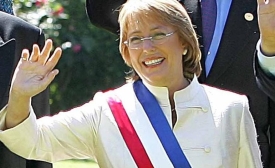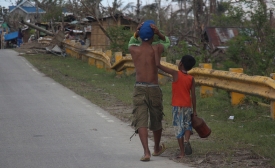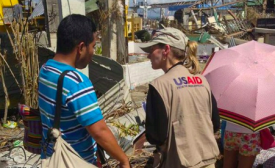public diplomacy

During the memorial service for former South African president Nelson Mandela, as tens of thousands gathered in the FNB stadium in Johannesburg and millions more watched on television, an entirely different story emerged: the ten-second interaction between U.S. President Barack Obama and Cuban President Raul Castro.
During the memorial service for former South African president Nelson Mandela, as tens of thousands gathered in the FNB stadium in Johannesburg and millions more watched on television, an entirely different story emerged: the ten-second interaction between U.S. President Barack Obama and Cuban President Raul Castro.

Congratulations to Michelle Bachelet, a supporter of global public diplomacy and contributor to CPD, on her re-election to the Chilean presidency.
Public diplomacy (PD), if defined as the act of a government engaging directly with a foreign public, then many governments are currently conducting PD towards the Filipino public in the aftermath of Typhoon Haiyan's devastation. Most public diplomacy scholars and practitioners refer to the foreign aid assistance in the wake of a disaster as "aid diplomacy."

Public diplomacy (PD), if defined as the act of a government engaging directly with a foreign public, then many governments are currently conducting PD towards the Filipino public in the aftermath of Typhoon Haiyan's devastation.

Public diplomacy (PD), if defined as the act of a government engaging directly with a foreign public, then many governments are currently conducting PD towards the Filipino public in the aftermath of Typhoon Haiyan's devastation. Most public diplomacy scholars and practitioners refer to the foreign aid assistance in the wake of a disaster as "aid diplomacy." This aid diplomacy is often spoken about in terms of foreign aid packages, goodwill gestures, and how foreign aid can help to increase a public's positive attitudes towards the aid-providing country.
U.S. political leaders have long spoken of America’s democracy as pivotal to its role in the world, whether it was Woodrow Wilson declaring in 1917 that the U.S. must enter World War I to make the world “safe for democracy,” or George W. Bush saying, on his re-election in 2004, that “It is the policy of the United States to seek and support the growth of democratic movements and institutions in every nation and culture.”
Confucius Institutes (CIs) are probably China’s most prominent, but also most controversial cultural diplomacy tool. There is a lot of debate going on concerning the political implications of CI’s, especially in the U.S. (the most recent example can be found here) but also elsewhere. While these debates are absolutely necessary and helpful to better understand these institutes, it sometimes seems there is more guessing and speculation rather than a fact based discussion.







